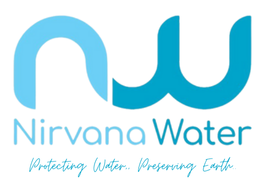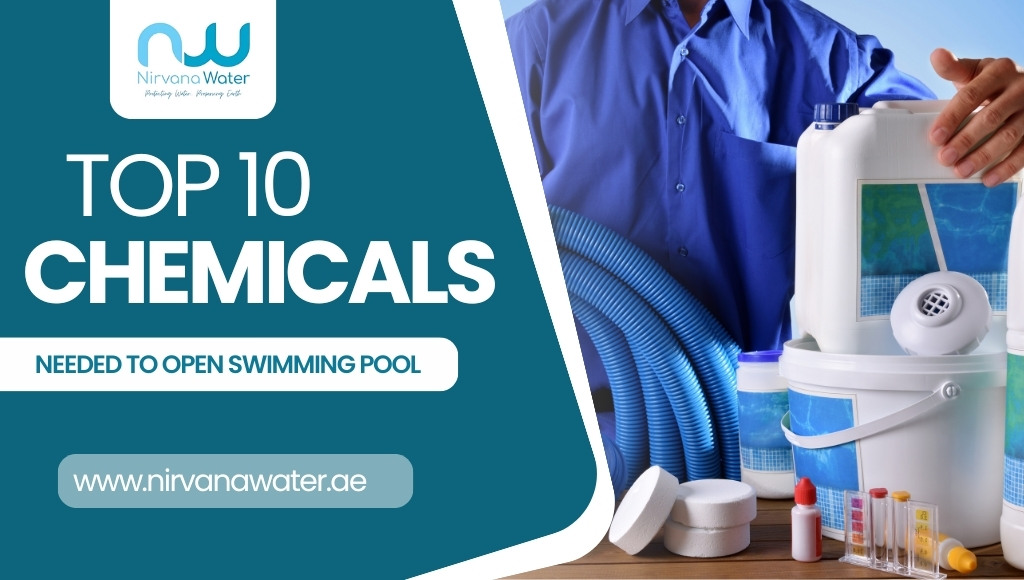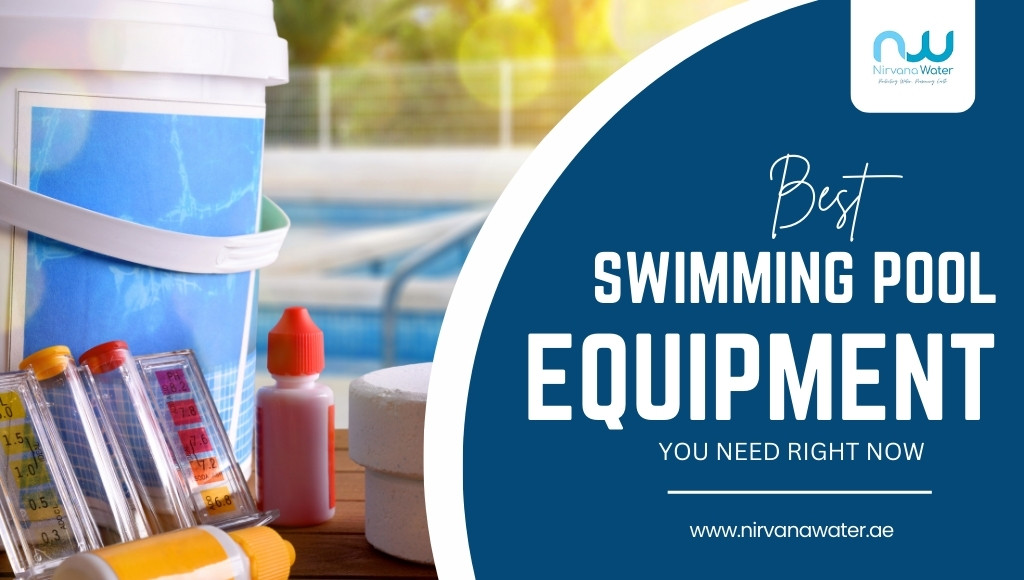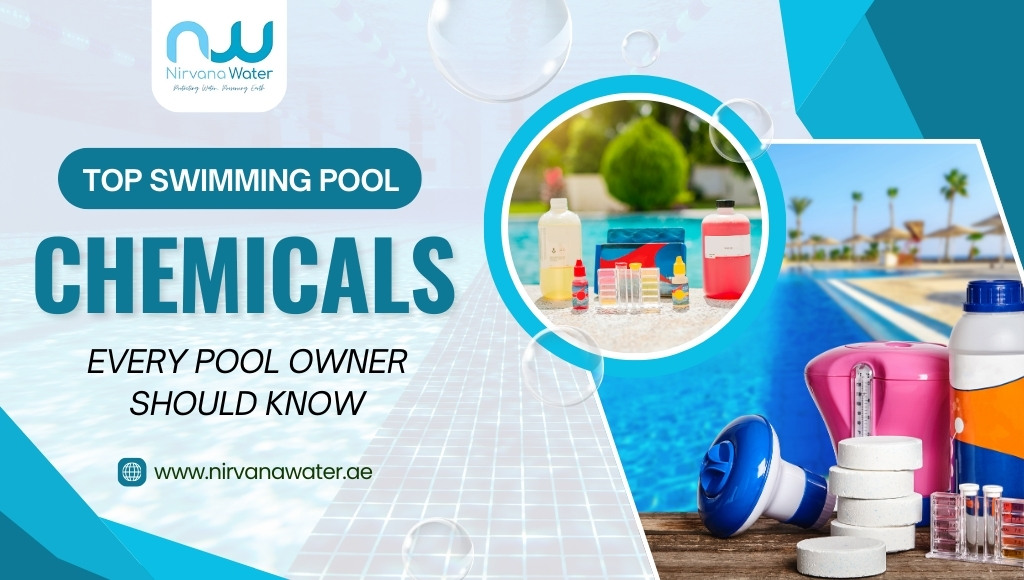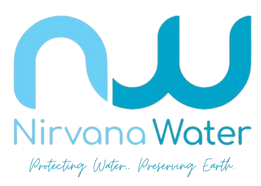Opening your swimming pool for the season is an exciting time. Whether you are a new pool owner or have managed a pool for years, knowing which chemicals to use is very important. The right chemicals not only keep your pool water safe and clean but also protect your pool equipment and surfaces.
Here, we have created a pool opening chemicals list that explains the top 10 chemicals needed to open a swimming pool. We will walk you through the pool opening chemicals process. If you live in the UAE, you can find high-quality products from the Best swimming pool chemicals suppliers in Dubai UAE and benefit from professional Swimming Pool Water Treatment in UAE.
Table of Contents
List of The Pool Opening Chemicals:
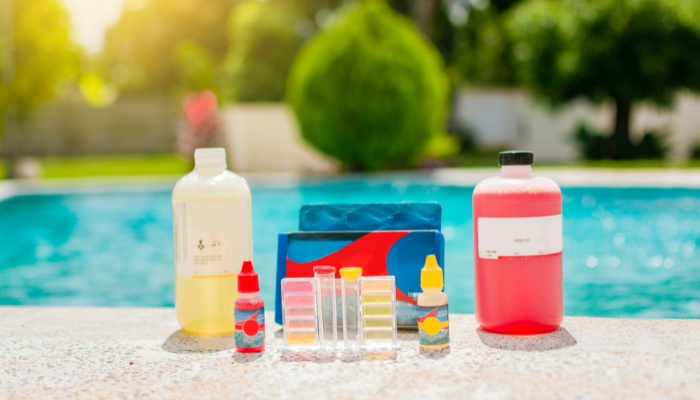
1. Chlorine
Chlorine is the most essential chemical for any pool. It is used to sanitize the water by killing bacteria, viruses, and algae. When you first open your pool, adding chlorine helps to clear out any contaminants that have built up while the pool is closed.
- Usage – You can use chlorine in granular form or as tablets. Follow the instructions on the package to select the correct dose.
- Benefits – It ensures the water is safe and sparkling clear.
- Tip – Always check the chlorine levels regularly, especially when the pool is in heavy use.
By starting your pool opening process with chlorine, you set the foundation for a clean swimming environment.
2. pH Adjusters
Maintaining the correct pH level is very crucial for both swimmer ease and the significance of chlorine. The pH of your pool water should be between 7.2 and 7.8.
- pH Increaser – Also known as soda ash, this chemical is utilized when the pH level is too low.
- pH Decreaser – Muriatic acid is used when the pH level is too high.
- Usage – Test the water with pH strips or a digital tester before adding any pH adjusters.
- Benefits – Correct pH levels prevent irritation of the eyes and skin and ensure that other pool chemicals work properly.
3. Alkalinity Increaser
Total alkalinity acts as a buffer for pH. Low alkalinity can cause rapid changes in pH, which can make the water uncomfortable for swimmers and damage pool equipment.
- Chemical Used – Sodium bicarbonate is often used to raise the alkalinity level.
- Usage – Add the chemical slowly and test the water until the desired alkalinity level (usually between 80-120 ppm) is reached.
- Benefits – Stable alkalinity helps keep the pH levels steady.
Ensuring proper alkalinity is a key part of Swimming Pool Water Treatment in UAE, especially in the warm climate of the region.
4. Calcium Hardness Increaser
Calcium hardness is a measurement of the amount of calcium in your pool water. It helps protect the pool surface from erosion and controls the water from becoming corrosive.
- Chemical Used – Calcium chloride is utilized to supplement calcium hardness.
- Usage – Follow the manufacturer’s instructions to add the correct amount. The perfect range for calcium hardness is usually 200-400 ppm.
- Benefits – Proper calcium levels help prevent damage to pool liners and equipment.
Maintaining the right calcium hardness is especially important if you live in areas with hard water, like many parts of the UAE.
5. Cyanuric Acid (Stabilizer)
Cyanuric acid is utilized to cover chlorine from being broken down by the sun’s ultraviolet rays. This is very important for outdoor pools, as it helps maintain an effective chlorine level for longer periods.
- Usage – Add cyanuric acid in the recommended dose. The ideal level is typically between 30-50 ppm.
- Benefits – It assists keep the chlorine in your pool active, reducing the need for frequent additions.
- Tip – Do not add too much; high levels of cyanuric acid can decrease chlorine’s significance.
Using a stabilizer like cyanuric acid is a common practice among the Best swimming pool chemicals suppliers in Dubai, UAE and is crucial for Swimming Pool Water Treatment in UAE.
6. Shock Treatment (Pool Shock)
Even with regular maintenance, contaminants like sweat, oils, and organic matter can build up in pool water. Pool shock is a high-dose chlorine therapy that eliminates these impurities and kills algae.
- Usage – Shock your pool at the start of the season and after heavy use. Follow the teachings on the shock therapy product for proper dosage.
- Benefits – It quickly clears up cloudy water and prevents algae blooms.
- Tip – Always shock the pool in the evening or at night to bypass chlorine loss due to sunlight.
Shock treatment is one of the most effective step-by-step pool opening chemicals you should use when starting your pool for the season.
7. Algaecide
Algae can quickly turn a beautiful pool into a green, slimy mess. An algaecide is a chemical that helps prevent and control algae growth.
- Usage – Add algaecide after the shock treatment and regular chlorine dosing.
- Benefits – Keeps the pool water clear and prevents algae from taking hold.
- Tip – Even if your pool is new or clean, using a small dose of algaecide during opening can help prevent future algae issues.
Algaecide is an essential item in your pool opening chemicals list for a sparkling, algae-free pool.
8. Clarifier
Even if you follow all the chemical treatments correctly, small particles can remain suspended in your pool water, making it look cloudy. A clarifier helps these tiny particles clump together so that the filter can extract them efficiently.
- Usage – Add clarifiers according to the product instructions, usually after the pool has been running for a day.
- Benefits – It improves water clarity and makes your pool look more inviting.
- Tip – Use clarifiers as part of your routine maintenance if you notice the water is not as clear as it should be.
Clarifiers are especially useful for pool owners who want to maintain perfect water clarity throughout the season.
9. Flocculant
A flocculant works similarly to a clarifier but is used for more severe cases of cloudiness. It binds tiny particles together, which then settle at the bottom of the pool.
- Usage – Typically, flocculants are added and then the pool is left undisturbed so that the particles can settle. The debris is then removed by vacuuming.
- Benefits – It is very effective in clearing up water that is very cloudy or has been neglected.
- Tip – Use a flocculant if the clarifier does not improve water clarity after several days.
Flocculants can be an important addition to your pool opening chemicals list if your pool needs extra help in achieving crystal-clear water.
10. Enzyme-Based Cleaners
Enzyme-based cleaners help break down organic matter, such as oils, lotions, and other debris that accumulate in the pool over time. They work naturally and help reduce the load on your filtration system.
- Usage – Add enzyme cleaners as recommended on the product label. They work overtime to keep your pool water clean.
- Benefits – They help prevent the buildup of scum lines and decrease the demand for harsh chemical medicines.
- Tip – Enzyme cleaners are a great eco-friendly option and are gentle on your pool surfaces.
These cleaners round out the step-by-step pool opening chemicals routine by ensuring that organic debris does not affect your pool’s water quality.
How To Use This Pool Opening Chemicals List:
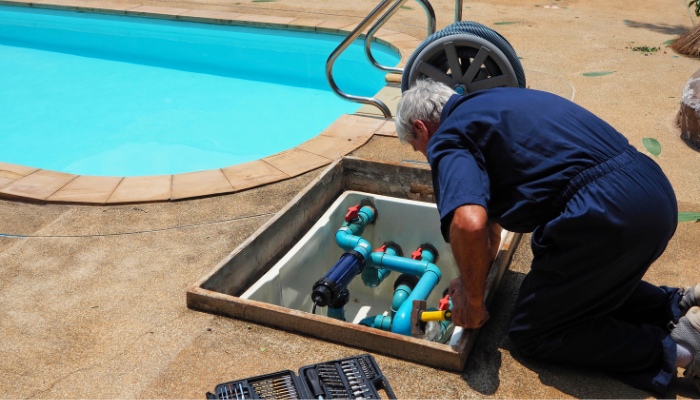
When you open your pool, follow these steps –
- Clean the Pool – Clear any debris, leaves, and dirt from the pool.
- Test the Water – Use a pool water testing kit to measure pH, chlorine levels, alkalinity, and calcium hardness.
- Add Chemicals in Order – Start with chlorine, then adjust the pH using the appropriate pH adjusters. Next, add alkalinity and a calcium hardness increase.
- Stabilize the Water – Add cyanuric acid to protect your chlorine.
- Shock the Pool – Use shock therapy to remove any impurities.
- Prevent Algae – Add algaecide as a preventive measure.
- Clarify and Flocculate – Use clarifiers and flocculants if needed, to improve water clarity.
- Finish with Enzymes – Add enzyme-based cleaners to break down organic debris over time.
Following this step-by-step pool opening chemicals guide will help ensure your pool is safe and inviting.
Where To Buy Your Swimming Pool Chemicals:
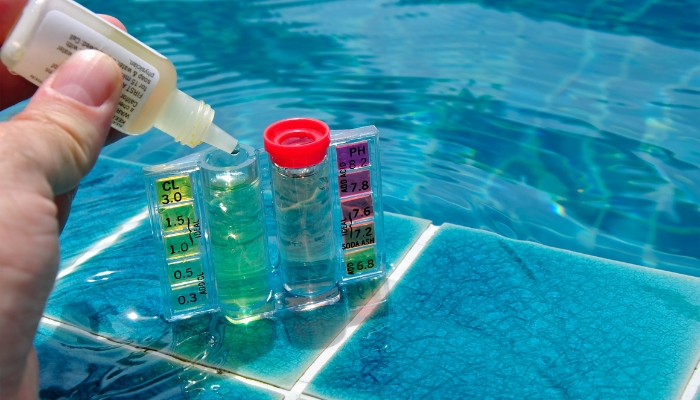
For those living in the UAE, it is important to choose trusted suppliers for your pool chemicals. Look for pool chemicals in Dubai and check reviews from other pool owners. The Best swimming pool chemicals suppliers in Dubai, UAE offer a wide range of products and expert advice to help you maintain your pool properly. They also provide professional Swimming Pool Water Treatment in UAE, ensuring that you get the best results.
Final Thoughts:
Opening your pool with the right chemicals is the first step toward a fun and safe swimming season. The pool opening chemicals list above covers the top 10 chemicals every pool owner should have. From chlorine to enzyme-based cleaners, each chemical plays a crucial part in keeping your pool water clean, balanced, and inviting.
Remember to constantly test your water before and after adding chemicals, and follow the instructions on each product carefully. If you have any questions, the experts at the Best swimming pool chemicals suppliers in Dubai UAE are there to help you. They can deliver detailed suggestions and answer any questions you might have about Swimming Pool Water Treatment in UAE.
